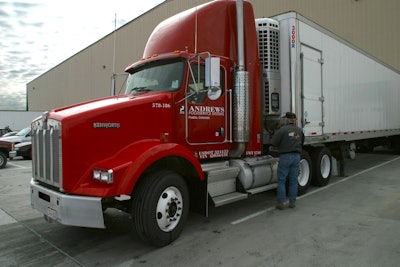
Years ago, a major national bus service attracted weary travelers using a catchy tagline that went something like “leave the driving to us.”
That tagline could sum up what some food manufacturers are letting their transportation providers do for them today. Manufacturers of quality food products often need to ship just a few pallets of product to their retailer customers. If they ship LTL loads, they face expensive and sometimes poor service. And their retailer customers face intensified labor requirements once they receive the LTL deliveries.
Multi-vendor consolidation (MVC) programs group manufacturers such as these so that each of the participants can enjoy full truckload economies, higher fill rates, and consistent on-time delivery performance. These programs eliminate for manufacturers the logistics headaches involved in getting their products delivered punctually to their customers, who could be scattered throughout the country. And manufacturers’ retailer customers appreciate having to deal with fewer trucks with fuller loads. It’s been reported that MVC programs can save shippers up to 40 percent of their transportation costs over using traditional LTL services.
We checked in with three food manufacturers whose relationships with their respective MVC providers continue to be as successful as possible containing costs and guaranteeing on-time deliveries that maintain their high customer service levels. Two manufacturers are relatively new to their programs, and one has been involved with an MVC program for over 15 years.
Why Share Transportation With Competitors?
MVC programs have been around for some time, evolving from the delivery requirements of club stores a few decades back. Even so, the model in the food industry is still quite new and has been developing, along with advances in the technology supporting the model, over the past 10 years or so.
Because the concept in the industry is still somewhat new, with only about 10 percent to 15 percent of eligible companies participating, the idea of sharing freight with competitors might initially concern some food shippers.
At Sun-Maid Growers of California, John Slinkard reports that he has no concerns about sharing freight because most of Sun-Maid’s competition is from manufacturers who don’t warehouse in the regions Sun-Maid does. “But that aside, why would I want to pay higher freight costs—especially if my competitors participate in consolidation programs,” says Slinkard, vice president of supply chain and customer service for the Kingsburg, CA-based company. “I can understand some initial reservations but long-term, I don’t think it’s a valid concern at all.”
“Freight is a major component of our supply chain costs,” says John Sommavilla, president and CEO of Coles Quality Foods Inc. in Grand Rapids, MI. “As long as the quality of our products is not compromised in combining them with other vendors’ products, we don’t mind sharing freight costs in an MVC program, which has a track record for driving efficiencies.”
John Slawny reports that he has no concerns about sharing freight with competitors. “Anything we can do to improve our shipping efficiencies only improves our competitive position,” says Slawny, vice president of sales and marketing for Gehl Foods in Germantown, WI.
Staff Of Life
Coles Quality Foods, manufacturing frozen bread products, has been in an MVC program with Hanson Logistics in Hobart, IN, for about three years. This program caters to the needs of one of Coles’ large customers—a major international retailer—with specific and strict demands. For instance, the retailer requires 100-percent fill rates on weekly deliveries to its extensive national network of DCs. Coles delivers several hundred thousand cases to this customer annually through its MVC program.
“These stipulations are difficult to achieve without a consolidation program,” says Sommavilla. “And our customer is also producing a report card on Coles’ performance. They know if we are a day late or a day early. So by consolidating with several other food manufacturers in our region, we can fill the truck, share the freight, and get there on time. These guaranteed weekly deliveries run like clockwork, and the program eliminates all the aggravation that could occur in servicing one of the biggest customers in the country.”
Coles operates two manufacturing facilities—one in Muskegon, MI, and the other in North Liberty, IA. Both facilities send product via third-party carriers to Hanson’s consolidation center in Hobart, IN. “It could be once a week using five trucks, or it could be using those five trucks over two or three days during a week,” explains Sommavilla. Inventory is received at Hanson’s dock and either flows through for delivery or it is put away for a few days until it is married up with the other vendors in the program.
Beyond the benefits of reduced costs and increased service levels, the MVC program allows Coles to focus fully on the specific needs of its customer. “We can deliver to each of their multiple national DCs with ease, and yet our sales team doesn’t ever have to be concerned about having to take calls from the retailer asking where its shipments are,” Sommavilla says. “We also don’t have to worry about having to defend our service position when our sales team meets the customer because of our excellent report card—which leads to additional sales and additional SKUs sold.”
Another benefit is worry-free billing. “There are zero issues with the accounting process involved,” Sommavilla reports. “Some MVC programs out there are a nightmare, like when they bill you for things like pallets that get out of rotation in the warehouse. We don’t run into accounting wars in our relationship with Hanson that people sometimes encounter with other providers out there.”
“The beauty of having Hanson handle the logistics and transportation for us is that it allows us to focus on what we do well, while the transportation and logistics experts get our products to our customer on time,” continues Sommavilla. “They are the last ones to see my customer, so Hanson plays a monumental role in protecting the Coles brand for us.”
Here’s To You!
Gehl Foods provides ready-to-drink beverages for a major international retailer, shipping nearly 1,000 trucks annually through the MVC program it operates with CaseStack in Fayetteville, AR. “We began this program in May of 2010 in response to our customer’s increased attention to on-time delivery and its associated savings in the supply chain,” explains Slawny. CaseStack is the customer’s preferred MVC provider, who has significantly reduced for Gehl the number of outbound shipments required while eliminating any concerns about securing on-time delivery appointments.
Slawny adds that Gehl could not afford to take a chance on the LTL open market for meeting these strict deadlines 100 percent of the time. “We chose to partner with CaseStack because we knew they had an existing relationship with our customer. They had guaranteed slots and guaranteed trucks in the lanes we required. So for us, this program eliminates those doubts about spot-buying transportation achieving 100-percent on-time delivery.”
Because of the assurance that shipments will arrive on time, Gehl does not have to budget for increased costs for late deliveries.
The process is strictly a cross-dock operation. The product is produced at Gehl’s manufacturing plant in Germantown and CaseStack manages transportation from Gehl’s dock to CaseStack’s cross-dock facility in Chicago. “So we have only one contact to schedule all of the loads for this customer, instead of having to worry about scheduling multiple separate inbounds.”
CaseStack picks up on Monday and Tuesday and cross-docks the product by mid-week. Gehl’s products are pooled with products from other vendors in the program and consolidated loads are delivered to each of this customer’s national DCs. “So our product could be at my customer by Friday of that same week.”
Slawny reports that the program required a change in Gehl’s production calendar. “It was painful for about seven days. But once we got used to the new schedule, it worked out just as well and sometimes better than our old schedule. Once you get the new system in place, you have to adjust to it only once.”
The consolidation program guarantees the availability of appointments, which is a big benefit, notes Slawny. Prior to operating the consolidation program, Gehl occasionally faced situations where the customer agreed to accept late delivery because it did not have an appointment available. “The spot market was getting better and more reliable. But we had no way to know for certain, so we made the decision to partner with a proven provider. We went from having to bid and schedule dozens of separate LTLs each week for our customer – to shipping far fewer consolidated loads through a single dispatcher. When everything leaves as a full truck, your average time spent per case sold drops significantly.”
The biggest benefit, reports Slawny, is the reduced time required in scheduling and loading trucks. “Prior to this program, everything for this customer went out as LTL. The thing is it doesn’t take that much longer to load a full truck as it does to load a quarter of a truck. You still need a bill of lading, an appointment, and you need to back the truck up to the dock. Now we can put more on a truck, which reduces the number of trucks waiting and the time to load them. We have been able to increase the amount of product going off our dock without having to add any additional personnel.”
Heard It through the Grapevine
Most of us have grown up knowing the familiar smiling arbor maid on boxes of raisins we might have found in our school lunch bags. About 66 percent of the over 240 million pounds of raisins and dried fruits Sun-Maid Growers of California produces annually is sold in the US. The company also enjoys a robust market overseas, where it sells the remaining 34 percent of its products to retailers in 57 countries. About 75 percent of the company’s product is raisins, with the remaining percentage accounting for over 30 different varieties of dried fruits, reports Slinkard.
Sun-Maid utilizes the services of several regional consolidation providers to ship product to 18 warehouses in North America for distribution to national retailers. It maintains multi-week inventories in each of these warehouses.
Sun-Maid has been operating its consolidation program (serving Texas and Oklahoma) with Dallas-based Shippers Warehouse for about 15 years. Shippers Warehouse approached Sun-Maid with its program, called Grocery Direct Consolidated Transportation (GDCT), because of the inherent benefits the logistics provider envisioned for Sun-Maid. “Sun-Maid sells its goods to retail grocery customers in LTL quantities, exactly the target consignee group that GDCT was designed for and put in place to serve,” explains Ken Johnson, president and CEO of Shippers Warehouse.
The real advantage of partnering with Shippers Warehouse is the consolidation information the provider shares with its clients, reports Slinkard. “They give us good rates and even better rates whenever they consolidate our loads. There are other warehouses in that region that could charge about the same for warehousing, storage, and handling. But what distinguishes Shippers Warehouse from other providers is the additional savings we get.”
Slinkard is "ecstatic" when he receives his monthly report from Shippers Warehouse. “It shows me how I am saving thousands and thousands of dollars every month because of the consolidations. This helps me keep my budget numbers reasonable.” He adds that Shippers Warehouse provides to its clients monthly reports showing the exact number of loads shipped and the additional savings resulting from consolidations. “Although some providers out there will consolidate shipments, we found they sometimes keep the additional savings for themselves.”
Retailers like the program as well because rather than having to receive five separate trucks with partial loads, they can receive one truck with product from those five vendors, explains Slinkard. “So there is only one appointment necessary, one truck, one truck driver, and one dock that is tied up. It is simply a lot more efficient.”
Products are picked up at the Kingsburg manufacturing facility, usually by intermodal carriers like JB Hunt, Schneider, or NYK Logistics. Shipments travel intermodally to the Dallas warehouse, where Shippers Warehouse inventories about 70 different Sun-Maid SKUs. “They maintain several weeks’ worth of inventory for each of those SKUs, then they draw from those stocks to fill orders for the individual retailers in that region,” explains Slinkard. “So the inbound deliveries are meant to replenish their stock.”
The Dallas facility serves Texas and Oklahoma. “If we were shipping out of Chicago to Texas, the chances that we would be able to consolidate would be next to zero, because it would be rare that there would be other grocery products in Chicago destined for the Texas market,” Slinkard explains. “Shippers Warehouse is the leader for grocery products in the Texas region where they have a huge opportunity to consolidate. This is especially important to us because there are a limited number of major grocery retailers in the Texas market.”
When evaluating a consolidation provider, choose one who is a major player in the region you wish to serve so there is the increased likelihood for consolidation to occur, advises Slinkard. “It’s the last leg of the journey that has the least amount of weight and that is the most expensive. So it helps to be close to the retailers you are serving so you can keep down the costs of that last leg.”
There is no reason for anyone to be concerned about sharing transportation with competitors. “Go for it,” encourages Slinkard. “If you don’t participate, your competitors will and you will only hurt yourself by not taking advantage of the benefits.”



















